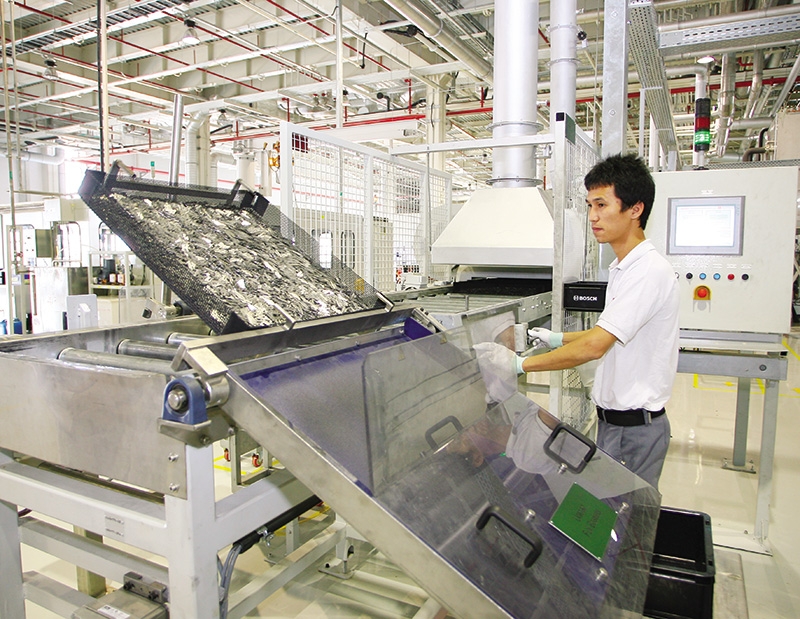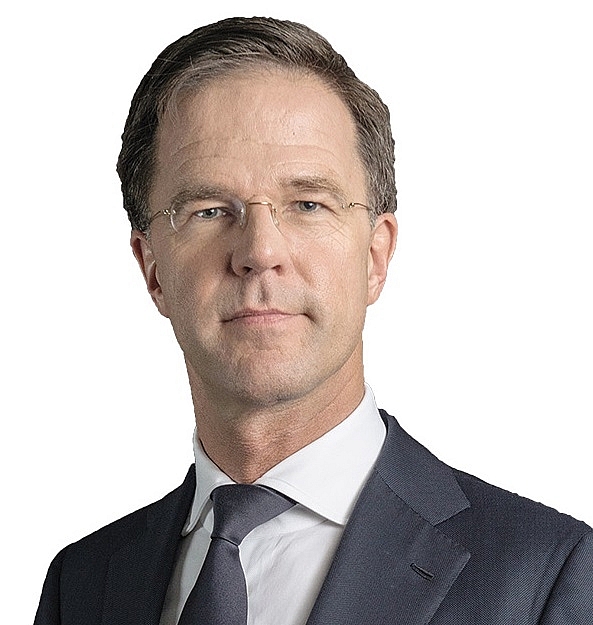EU treaties open new doors
 |
| The EVFTA and EVIPA will provide extraordinary opportunities for Vietnam to grow, Photo: Le Toan |
When I took up my role in Vietnam, the negotiations for the EU-Vietnam Free Trade Agreement (EVFTA), which also included the EU-Vietnam Investment Protection Agreement (EVIPA), were finalised just after a few months, in December 2015.
These negotiations began in 2012 and the swift results showed the mutual interests of both sides in strengthening the partnership with a new trade and investment chapter. This created additional upbeat sentiments in the business communities and has been an essential part of my work in Vietnam.
Brilliant milestone
 |
| Marc van der Linden |
I was very much pleased to witness the signing of the EVFTA and the EVIPA on June 30 between the two sides. A broad delegation of the Vietnamese government, the National Assembly, and the president’s office headed by Prime Minister Nguyen Xuan Phuc witnessed this milestone event together with diplomatic and business representatives from the EU, the ASEAN, and other economic partners of Vietnam. It was a great show of support for deepening and broadening the economic partnership. Now, the last hurdle to pass is ratification in Vietnam and the EU, and this requires the Vietnamese National Assembly, the EU Parliament, and the EU member states. Then we can see the effects of this ambitious FTA that sets a new standard for the EU’s economic partnerships with developing and emerging markets – one that focuses on trade, responsible business conduct, sustainability, and inclusiveness. These values are pre-requisites for successful and sustainable economic development.
In this respect, many positive developments have taken place in Vietnam. Sustainability is more prominent on the Vietnamese agenda with interests in circular economy and increasing opportunities for renewable energy development, such as solar and offshore wind.
The Vietnamese National Assembly passed the new Labour Code, and the International Labour Organization’s (ILO) Convention 98 on the Right to Organise and Collective Bargaining has been ratified. A roadmap to prepare Vietnam for EVFTA implementation has also been agreed and is being rolled out. More and more, Vietnam is integrating into the global economy, striving for an international rules-based order on World Trade Organization principles. Additionally, Vietnam is also becoming a stronger partner on the multilateral stage in becoming a member of the UN Security Council for 2020-2021, as well as the country deploying a field hospital in the UN mission in South Sudan.
Hence, the EVFTA and EVIPA partnership is not a surprise. Key characteristics of both trading partners is the aim to be involved in many FTAs, making Vietnam an ideal linking pin for EU and Dutch companies either as a direct consumer market with nearly 100 million customers, a business-to-business market – foreign direct investment (FDI) and the domestic sector continue to grow robustly – and, also, an investment destination to service third markets. This includes easier access to countries that have an FTA with Vietnam and the EU, such as South Korea, Japan, Singapore, and Canada.
Another boon for EU firms is eligibility for Vietnamese government procurement that will lead to better services and products for the country and an incentive to have partnerships between Vietnamese and European companies.
Within EU-Vietnam trade and investment relations, the Netherlands takes a leading position in being the largest EU investor and the second-largest EU trade partner. Key sector interests include water, agriculture, shipbuilding, port development, offshore wind, and transport and logistics.
Overarching connections we see are in circular economy applications and smart urban planning, as a means to support sustainable economic development where resilient cities play a major part. I have seen over the last four years a continuous effort by the Vietnamese government to improve the business environment which has been reflected in many indices and rankings.
The World Bank’s Ease of Doing Business ranking has improved significantly; the Vietnamese stock exchange has signalled increased confidence, the purchasing managers index had only a short minor dip in 2015, FDI continues to grow, and annual GDP growth rate has been the strongest compared to its regional peers. In short, Vietnam’s trade and investment fundamentals remain strong and show perspective for more growth with the new treaties.
Hurdles to overcome
However, this does not mean that there are no concerns for the Dutch government or the Dutch business community. These concerns will affect the speed, size, and impact of Dutch and EU trade and investment. Where the FTA is removing most, if not all, tariffs on trade, we do see existing and new non-tariff barriers to trade.
This is visible for areas such as car and car-part imports, regulation on the pharmaceutical industry, and distribution and market access for agriculture, livestock, and fishery products. The economic partnership between the EU and Vietnam requires a level playing field for domestic and foreign companies, on both sides.
Concerns in another field relate to sustainable trade and development, the application of responsible business conduct. As part of our values and getting the most out of economic development, we put much emphasis on the liberties of and safeguards for our citizens. High productivity is possible when you invest in education and create an environment with safeguards. This we promote through the core ILO conventions, with two still needing to be ratified by Vietnam.
As the signatories pointed out, with the signing of the EVFTA and EVIPA, the governments have done their part to lay the groundwork for better and responsible trade and investment opportunities in the EU and in Vietnam.
It is up to the companies to seize these opportunities, an ambition that the Dutch embassy will fully support and facilitate. We will also closely monitor outstanding concerns in order to materialise the full scope of the most ambitious FTA that the EU has ever signed.
I am fully confident that the Netherlands will remain a key EU trade and investment partner to Vietnam. This continues to be an interesting market, as seen in the large trade delegation of Dutch Prime Minister Rutte to Vietnam in April this year. This was not only the largest business delegation to date, but a wide Dutch government representation also joined Prime Minister Rutte to strengthen the bilateral relationship on many topics.
To grasp the country’s full potential as an economic and comprehensive partner, there is work to be done to find the middle ground that provides a win-win scenario to both Vietnam and the EU, and it is assignment that is at the core of our work here in Vietnam.
| Mark Rutte Prime Minister, Kingdom of the Netherlands
At the moment, we are the biggest investor in Vietnam from the European Union with $9.55 billion in registered capital, and we are also the second-biggest trade partner from the EU after Germany, with $7.8 billion in two-way trade in 2018. We take pride that some Dutch companies are performing well here, such as FrieslandCampina, DeHeus, Unilever, Philips, AkzoNobel, Shell, and Damen. They are operating in many localities around Vietnam, such as the northern city of Haiphong, and successfully teaming up with Vietnamese partners. Now we have a trade commission of 70 companies coming to the country. The most fantastic thing about these companies is that they operate in a wide range of sectors, such as agriculture and horticulture, water, logistics, and offshore wind energy. They are seeking opportunities to invest in Vietnam and also investment opportunities for Vietnamese companies in the Netherlands. More and more Dutch entrepreneurs come here to explore business opportunities and Dutch companies already present are expanding their investment. I am confident that their numbers will continue to increase. |
What the stars mean:
★ Poor ★ ★ Promising ★★★ Good ★★★★ Very good ★★★★★ Exceptional
Themes: EVFTA & EVIPA
Related Contents
Latest News
More News
- Hermes joins Long Thanh cargo terminal development (February 04, 2026 | 15:59)
- SCG enhances production and distribution in Vietnam (February 04, 2026 | 08:00)
- UNIVACCO strengthens Asia expansion with Vietnam facility (February 03, 2026 | 08:00)
- Cai Mep Ha Port project wins approval with $1.95bn investment (February 02, 2026 | 16:17)
- Repositioning Vietnam in Asia’s manufacturing race (February 02, 2026 | 16:00)
- Manufacturing growth remains solid in early 2026 (February 02, 2026 | 15:28)
- Navigating venture capital trends across the continent (February 02, 2026 | 14:00)
- Motivations to achieve high growth (February 02, 2026 | 11:00)
- Capacity and regulations among British areas of expertise in IFCs (February 02, 2026 | 09:09)
- Transition underway in German investment across Vietnam (February 02, 2026 | 08:00)


 Tag:
Tag:




















 Mobile Version
Mobile Version